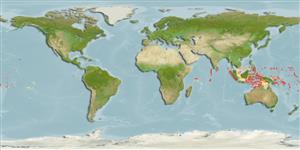Environment: milieu / climate zone / depth range / distribution range
Ecology
Marine; reef-associated; non-migratory; depth range 6 - 40 m (Ref. 9790). Tropical; 10°N - 15°S
Indo-Pacific: Reunion east to American Samoa, south to Australia.
Size / Weight / Age
Maturity: Lm ? range ? - ? cm
Max length : 13.0 cm TL male/unsexed; (Ref. 9790); common length : 8.0 cm TL male/unsexed; (Ref. 9790)
Dorsal spines (total): 9; Dorsal soft rays (total): 11; Anal spines: 0; Anal soft rays: 11. Preopercle with a small antrorse spine. Infraorbital and suborbital ridges bearing many fine serrations. Preocular spines 2-3. Lower side of head bicarinate. Iris lappet slightly bilobed. (Ref. 9790).
Found in sandy areas of lagoons and seaward reefs. Usually caught with trawls in deeper water (Ref 90102).
Life cycle and mating behavior
Maturities | Reproduction | Spawnings | Egg(s) | Fecundities | Larvae
Knapp, L.W., 1999. Platycephalidae. Flatheads. p. 2385-2421. In K.E. Carpenter and V.H. Niem (eds.) FAO species identification guide for fishery purposes. The living marine resources of the Western Central Pacific. Volume 4. Bony fishes part 2 (Mugilidae to Carangidae). FAO, Rome. (Ref. 9790)
IUCN Red List Status (Ref. 130435)
Threat to humans
Harmless
Human uses
Fisheries: of no interest
Tools
Special reports
Download XML
Internet sources
Estimates based on models
Preferred temperature (Ref.
123201): 27.8 - 29.1, mean 28.5 °C (based on 114 cells).
Phylogenetic diversity index (Ref.
82804): PD
50 = 0.5078 [Uniqueness, from 0.5 = low to 2.0 = high].
Bayesian length-weight: a=0.00525 (0.00246 - 0.01120), b=3.04 (2.85 - 3.23), in cm total length, based on LWR estimates for this (Sub)family-body shape (Ref.
93245).
Trophic level (Ref.
69278): 3.5 ±0.6 se; based on size and trophs of closest relatives
Resilience (Ref.
120179): High, minimum population doubling time less than 15 months (Preliminary K or Fecundity.).
Fishing Vulnerability (Ref.
59153): Low vulnerability (10 of 100).
